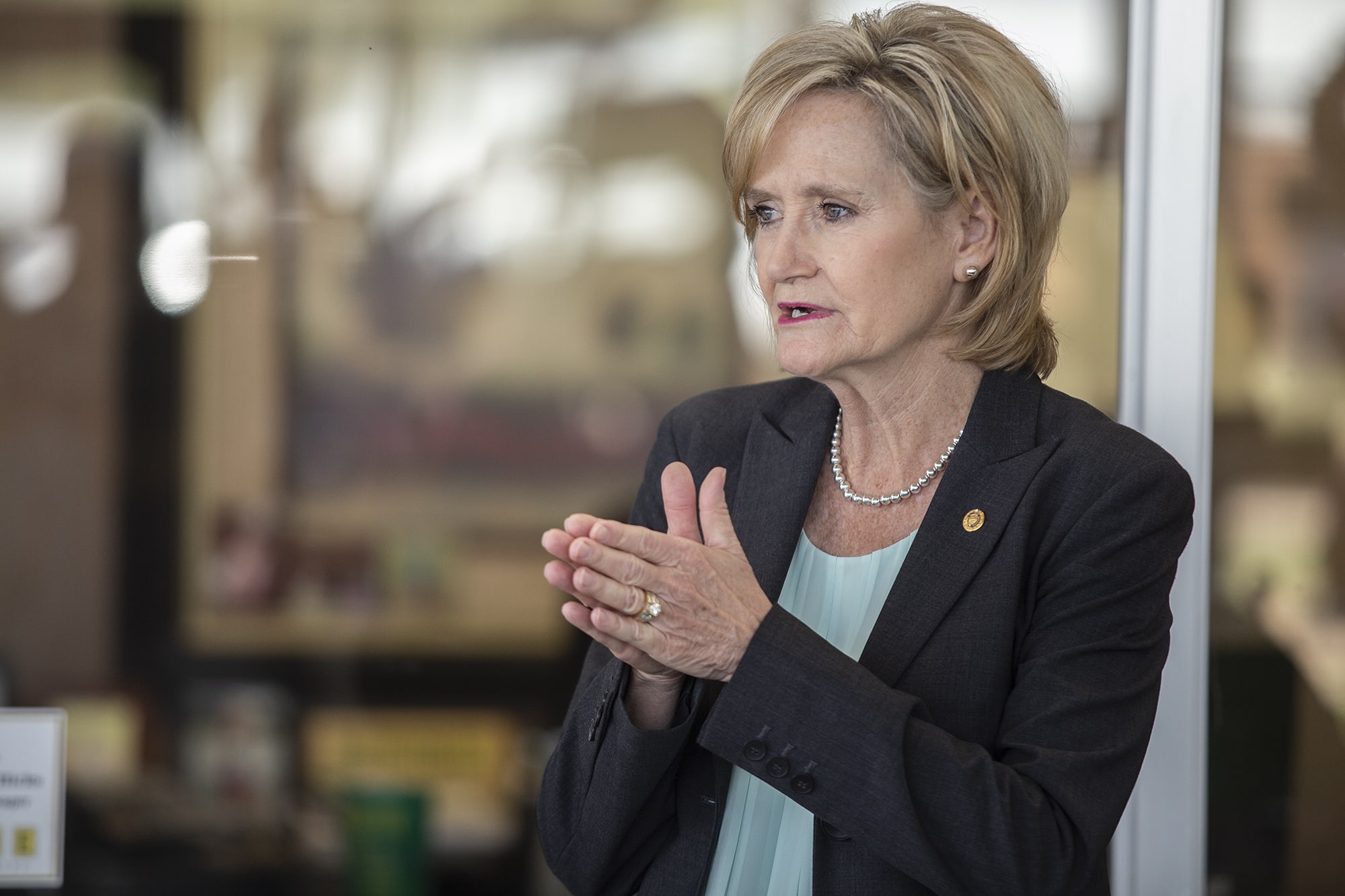Mississippi Today
Lawmakers honor Sen. Cindy Hyde-Smith, but Dems say it’s time for her to allow vote on federal judge

Twelve Senate Democrats did not vote for a resolution Thursday honoring U.S. Sen. Cindy Hyde-Smith as being the first woman elected to represent Mississippi in Washington because she is blocking a vote on the nomination of Scott Colom to a federal judgeship.
“As Democrats we support women being elected to political office,” said Sen. Derrick Simmons, D-Greenville, who is the chamber's minority leader. But Simmons said the decision not to vote on Hyde-Smith's resolution was to bring attention to her refusal to allow the U.S. Senate to vote on Colom's nomination by President Joe Biden to serve as a federal judge in the Northern District of Mississippi.
Because of a sometimes-honored U.S. Senate tradition, senators from the home state of a nominee for the U.S. district court can block a vote on the nominee by refusing to return a so-called “blue slip.” Colom's nomination has bipartisan support from Roger Wicker, Mississippi's senior U.S. senator, and also from former Republican governors Haley Barbour and Phil Bryant.
“Democrats are concerned with Cindy Hyde-Smith holding up the nomination of Scott Colom,” Simmons said. “No Democrat opposes the worth of the resolution honoring her. But we do feel that it is important that the federal posts in Mississippi that deal with law and order be filled. We support Scott Colom's nomination just like a broad range of people.”
No member of the state Senate voted against the resolution that now goes to the House. But 11 of the 16 Senate Democrats did not vote. A 12th, Brandon Blackmon of Canton, voted present. The resolution actually was voted on twice due to procedural issues. The first time Blackmon voted for it. Four other Democrats voted for the resolution both times it was offered.
In the past, Hyde-Smith has said she is blocking the nomination of Colom, the first African American elected as district attorney for the 16th District in north Mississippi, because he opposed legislation banning trans women from competing in women's sports.
While Colom has voiced general support for trans rights, he has never publicly commented on the issue of trans women competing in women sports.
Hyde-Smith also said she opposed Colom because a political action committee funded at least in part by billionaire George Soros spent funds on his first election to the office of district attorney in 2015. Soros, a New York billionaire, has supported criminal justice reform and other issues such as governmental transparency. Colom has said he did not know the PAC had received campaign contributions from Soros until it was reported in the media.
READ MORE: U.S. Senate chairman ‘extremely disappointed' by Hyde-Smith's effort to block judicial nomination
The blue slip process that Hyde-Smith is using to block a vote on Colom's nomination began as a method to preserve segregation and racial discrimination in the South.
Starting in the 1950s, U.S. Sen. James Eastland of Mississippi was the first Senate Judiciary Committee chair to use the process to allow a single home-state senator to block a presidential nominee to the federal bench. Eastland used the process to block federal judges from being appointed in Southern states sympathetic to school desegregation, according to multiple accounts detailed in news stories and scholarly research articles.
In 2017, during his time as Senate Judiciary chair, conservative Sen. Chuck Grassley, a Republican from Iowa, wrote: “For the vast majority of the blue slip's history, a negative or unreturned blue slip did not stop the Senate Judiciary Committee from holding a hearing and vote on a nominee. In fact, of my 18 predecessors as chairman of the committee, only two allowed home-state senators unilateral veto power through the blue slip. The first to do so, Sen. James Eastland (D-Miss.), reportedly adopted this policy to thwart school integration after the Supreme Court's decision in Brown v. Board of Education.”
Hyde-Smith previously served in the Mississippi Senate before being elected to the statewide post of commissioner of agriculture and commerce. In 2018, Bryant appointed her to the U.S. Senate to replace Thad Cochran, who opted to retire. She has since been elected to the U.S. Senate twice.
This article first appeared on Mississippi Today and is republished here under a Creative Commons license.
Mississippi Today
Renada Stovall, chemist and entrepreneur
Renada Stovall sat on the back deck of her rural Arkansas home one evening, contemplating life when she had a life-altering epiphany…
“I gotta get out of these woods.”
She heard it as clear as lips to her ear and as deep as the trees surrounding her property. Stovall's job as a chemist had taken her all over the country. In addition to Arkansas, there were stints in Atlanta, Dallas and Reno. But she was missing home, her parents and friends. She also knew, she needed something else to do.
“I thought, what kind of business can I start for myself,” said Stovall, as she watered herbs growing in a garden behind her south Jackson home. Some of those herbs are used in her all-natural products. “I know when I lived in Reno, Nevada, where it's very hot and very dry, there really weren't products available that worked for me, my hair, and my skin suffered. I've got a chemistry degree from Spelman College. I took the plunge and decided to create products for myself.”

In 2018, Stovall's venture led to the creation of shea butter moisturizers and natural soaps. But she didn't stop there, and in December 2022, she moved home to Mississippi and got to work, expanding her product line to include body balms and butters, and shampoos infused with avocado and palm, mango butter, coconut and olive oils.
Nadabutter, which incorporates Renada's name, came to fruition.

Stovall sells her balms and moisturizers at what she calls, “pop-up markets,” across the state during the summer. She's available via social media and also creates products depending on what of her ingredients a customer chooses. “My turmeric and honey is really popular,” Stovall added.
“The all-natural ingredients I use are great for conditioning the skin and hair. All of my products make you feel soft and luscious. The shea butter I use comes from West Africa. It's my way of networking and supporting other women. And it's my wish that other women can be inspired to be self-sufficient in starting their own businesses.”





This article first appeared on Mississippi Today and is republished here under a Creative Commons license.
Mississippi Today
On this day in 1954
MAY 17, 1954

In Brown v. Board of Education and Bolling v. Sharpe, the U.S. Supreme Court unanimously ruled that the “separate but equal” doctrine in Plessy v. Ferguson was unconstitutional under the 14th Amendment, which guaranteed equal treatment under the law.
The historic decision brought an end to federal tolerance of racial segregation, ruling in the case of student Linda Brown, who was denied admission to her local elementary school in Topeka, Kansas, because of the color of her skin.
In Mississippi, segregationist leaders called the day “Black Monday” and took up the charge of the just-created white Citizens' Council to preserve racial segregation at all costs.
This article first appeared on Mississippi Today and is republished here under a Creative Commons license.
Mississippi Today
Every university but Delta State to increase tuition this year
Every university in Mississippi is increasing tuition in the fall except for Delta State University.
The new rates were approved by the governing board of the eight universities, the Institutions of Higher Learning Board of Trustees, at its regular meeting Thursday.
The average cost of tuition in Mississippi is now $8,833 a year, a roughly 3% increase from last year. Students can expect to pay tuition ranging from $7,942 a year at Mississippi Valley State University to $10,052 a year at Mississippi State University.
In recent years, universities have cited inflation and rising insurance costs as reasons for the tuition increases. At Thursday's meeting, the board heard a presentation on how property insurance is becoming more expensive for the eight universities as Mississippi sees more tornadoes and storms with severe wind and hail.
READ MORE: Tuition increases yet again at most public universities
But it's an ongoing trend. Mississippi's public universities have steadily increased tuition since 2000, putting the cost of college increasingly out of reach for the average Mississippi family. More than half of Mississippi college students graduated with an average of $29,714 in student debt in 2020, according to the Institution for College Access and Success.
At Delta State University, the president, Daniel Ennis, announced that he will attempt to avoid tuition increases as the regional college in the Mississippi Delta undergoes drastic budget cuts in an effort to become more financially sustainable.
“We will resist tuition increases so that our most economically vulnerable students can continue to have access to the opportunities that a college degree can provide,” he wrote in a memo to faculty and staff on Monday. “We will move beyond basic survival and into a place where we have the capacity to take better advantage of our undeniable strengths.”
Delta State didn't increase tuition last year, either. Officials have been concerned the university is becoming too pricey for the students it serves.
Tuition for the 2024-25 academic year, by school:
- Alcorn State University: $8,105
- Delta State University: $8,435
- Jackson State University: $8,690
- Mississippi State University: $10,052
- Mississippi University for Women: $8,392
- Mississippi Valley State University: $7,492
- University of Mississippi: $9,612
- University of Southern Mississippi: $9,888
This article first appeared on Mississippi Today and is republished here under a Creative Commons license.
-
SuperTalk FM5 days ago
Martin Lawrence making 3 stops in Mississippi on comedy tour
-
Our Mississippi Home3 days ago
Beat the Heat with Mississippi’s Best Waterparks
-
Our Mississippi Home4 days ago
Charlie’s U-Pik: Opening Soon for the Summer Season
-
Mississippi News Video7 days ago
Local dentists offer free dental care in Amory
-
Kaiser Health News4 days ago
Medicaid ‘Unwinding’ Decried as Biased Against Disabled People
-
Mississippi News Video3 days ago
Jackson has a gang problem
-
SuperTalk FM13 hours ago
State auditor cracking down on Mississippians receiving unemployment benefits
-
Mississippi Today7 days ago
On this day in 1968





































